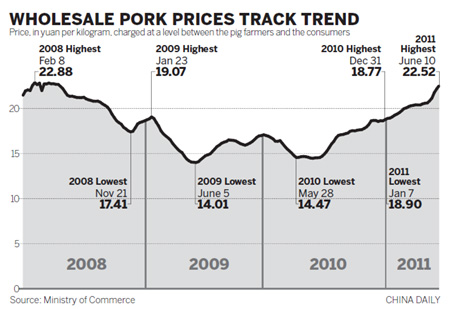Economy
Increasing pork prices breed hopes, worries
Updated: 2011-06-23 09:30
By Hu Yongqi in Shandong province and Li Jiabao in Beijing (China Daily)

Slaughter slowdown
Pork processors also are feeling the effects of increased costs to farmers and higher market prices.
"It has become difficult to buy grown pigs now," said Zhang Youtang, general manager of Qimeisi Pork, the biggest pork processor in Linzi district. The factory produces 15 tons of pork each day.
"Though pig and pork prices increased, the profit my factory earns dropped by 20 percent because much less pork is produced," Zhang said.
Every morning, seven employees called collectors are sent to villages to find and buy pigs, but most bring back fewer than 20, half of the number last year. And half the usual number are run through the production line, where agile butchers can handle three pigs in one minute.
With fewer pigs to process, butchers are working fewer hours, but at their full pay rate, said Yang Yandong, who is in charge of production in the factory.
Grocery bills
Grocery shoppers have already noticed. Compared with a year ago, the price of pork was up 41.5 percent in May and 45.5 percent in June. On Wednesday, the average price was 25.46 yuan a kg, which was 1.55 yuan a kg higher than on Tuesday.
|
||||
Feng also noted that about 65 percent of China's meat is pork. If consumers find it too expensive, they "may end up turning to vegetables for alternatives, and that would raise their prices. The flooding in the South could further raise vegetable prices."
It also could raise the consumer price index (CPI), because it's "an important factor in the calculation", said the information center's Zhu. "A price increase of 40 percent could add 1.2 percentage points to the CPI."
China's CPI surged by 5.5 percent in May from a year earlier, with food price contributing about 11.1 percent to the increase, according to National Bureau of Statistics.
E-paper

Pret-a-design
China is taking bigger strides to become a force in fashion.
Preview of the coming issue
Franchise heating up
Party place
Specials

My China story
Foreign readers are invited to share your China stories.

Mom’s the word
Italian expat struggles with learning English and experiences the joys of motherhood again.

Lenovo's challenge
Computer maker takes on iconic brand apple with range of stylish, popular products




